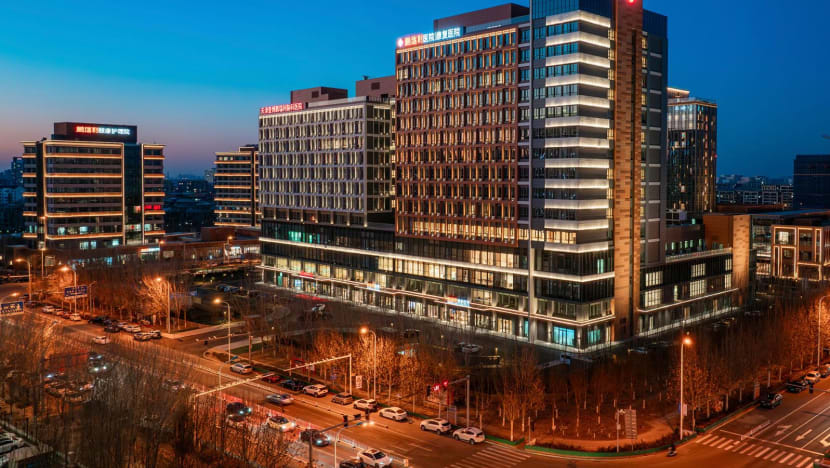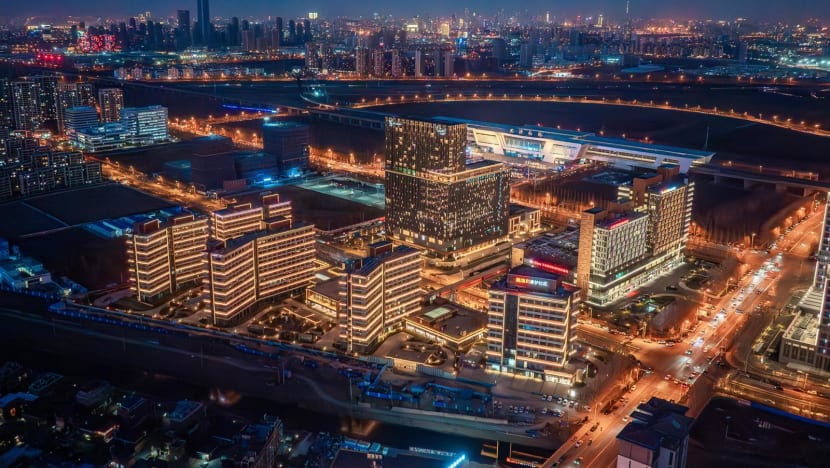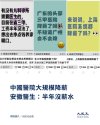- Joined
- Apr 14, 2011
- Messages
- 17,878
- Points
- 113
Let’s see when this will implode.

Perennial General Hospital in Tianjin city, China. (Photo: Perennial Holdings)
Listen to this article
5 min
This audio is generated by an AI tool.

Emil Chan
17 Dec 2024 10:32AM (Updated: 17 Dec 2024 01:14PM)
BookmarkShare
SINGAPORE: Real estate and healthcare firm Perennial Holdings has become the first foreign company to wholly own a private tertiary general hospital in China, after its hospital in Tianjin city was given approval by Chinese authorities.
In September, China announced that fully foreign-owned hospitals will be allowed to operate in several key cities, including Beijing and Tianjin.
ADVERTISEMENT
Singapore-based Perennial said on Monday (Dec 16) that its Perennial General Hospital, a 500-bed tertiary multi-disciplined hospital, has successfully passed an inspection by Tianjin city’s Municipal Health Commission and will be commencing operations soon.
“We are excited to develop, own and operate China’s first wholly foreign-owned private tertiary general hospital, Perennial General Hospital Tianjin, following China’s recent move to open up its healthcare sector,” said Perennial CEO and executive chairman Pua Seck Guan.
“This being the first general hospital built and managed by Perennial Holdings further adds to the significance of this milestone.”
Perennial's key shareholders include Mr Kuok Khoon Hong of agribusiness group Wilmar and Mr Ron Sim, the founder of Osim International.
Located in Xiqing District, Perennial General Hospital was developed and equipped at a total investment cost of 1 billion yuan (US$137 million).
It features an asset-light co-medical space concept for doctors and medical groups called the Shared Medical Platform, where they focus on providing medical consultations and treatments without having to invest in medical facilities and services.
ADVERTISEMENT
Doctors and medical groups can instead rely on the shared medical facilities and services provided and managed by Perennial Holdings, including advanced operating theatres, diagnostic imaging equipment and a clinical laboratory.
 A single-bed hospital room at Perennial General Hospital in Tianjin city, China. (Photo: Perennial Holdings)
A single-bed hospital room at Perennial General Hospital in Tianjin city, China. (Photo: Perennial Holdings)
“Our unique asset-light co-medical space concept for doctors and medical groups with different partnership models, allows us to embrace many medical professionals and build an extensive and sustainable ecosystem to further the growth of our healthcare business in China,” said Mr Pua.
“The Singapore-modelled Shared Medical Platform also supports them to expand and scale alongside us with minimal capital investments.”
The hospital also has its own team of medical specialists in a variety of disciplines including orthopedics, ophthalmology, otolaryngology, nephrology and immunology, cardiology, oncology and other fields.
The hospital is part of an integrated medical hub called the Perennial Tianjin South High-Speed Railway (HSR) International Healthcare and Business City (PIHBC Tianjin), which is adjacent to the Tianjin South HSR Station.
 Perennial Tianjin South High-Speed Railway (HSR) International Healthcare and Business City in Tianjin city, China. (Photo: Perennial Holdings)
Perennial Tianjin South High-Speed Railway (HSR) International Healthcare and Business City in Tianjin city, China. (Photo: Perennial Holdings)
PIHBC Tianjin is a development that that integrates eldercare, medical care and hospitality around the China’s HSR system, providing care to the community within the Xiqing District and the wider Beijing-Tianjin-Hebei region via the adjacent Tianjin South HSR Station’s subway and HSR network.
ADVERTISEMENT
The 500-bed Perennial General Hospital Tianjin, is an integral part of PIHBC Tianjin’s hospital ecosystem, together with the 200-bed Perennial Rehabilitation Hospital Tianjin, a secondary rehabilitation hospital, the 300-bed Eber Perennial Brain Hospital Tianjin, a tertiary brain hospital, and the 300-bed Perennial Nursing Hospital Tianjin.
PIHBC Tianjin also comprises the Perennial Eldercare Community with over 1,800-beds and four hotels of different star ratings totalling about 1,000 rooms.
“Perennial General Hospital Tianjin will pave the way to draw more foreign patients seeking private medical treatments in Tianjin, thereby raising the country’s medical industry’s international standing and driving the growth of Tianjin’s medical tourism industry,” said Mr Pua.
“Tianjin government’s all rounded and highly efficient support across ministries throughout the rigorous approval process provides foreign companies with first-class service which is extremely conducive for businesses."
Perennial Holdings’ is growing its portfolio of hospitals in China, with a pipeline of over 3,000 beds being developed in the group’s upcoming healthcare-centric developments in Kunming, Xi’an and Guangzhou.
ADVERTISEMENT
SCROLL TO CONTINUE WITH CONTENT
SCROLL TO CONTINUE WITH CONTENT
China’s “forward-looking policy sends a strong positive signal to the international investment community, boosts confidence for investors keen on China’s healthcare space and drives foreign investments and foreign-local collaborations given the growth prospects of China,” said Mr Pua.
“We are confident of China’s medical care market’s growth trajectory and will actively foster foreign-local hospital collaboration and knowledge exchange as well as bring in foreign medical professionals and expertise to elevate the standards of private medical care to complement the government’s public healthcare to benefit the community.”
Singapore’s Perennial the first foreign company to wholly own tertiary hospital in China

Perennial General Hospital in Tianjin city, China. (Photo: Perennial Holdings)
Listen to this article
5 min
This audio is generated by an AI tool.

Emil Chan
17 Dec 2024 10:32AM (Updated: 17 Dec 2024 01:14PM)
BookmarkShare
SINGAPORE: Real estate and healthcare firm Perennial Holdings has become the first foreign company to wholly own a private tertiary general hospital in China, after its hospital in Tianjin city was given approval by Chinese authorities.
In September, China announced that fully foreign-owned hospitals will be allowed to operate in several key cities, including Beijing and Tianjin.
ADVERTISEMENT
Singapore-based Perennial said on Monday (Dec 16) that its Perennial General Hospital, a 500-bed tertiary multi-disciplined hospital, has successfully passed an inspection by Tianjin city’s Municipal Health Commission and will be commencing operations soon.
“We are excited to develop, own and operate China’s first wholly foreign-owned private tertiary general hospital, Perennial General Hospital Tianjin, following China’s recent move to open up its healthcare sector,” said Perennial CEO and executive chairman Pua Seck Guan.
“This being the first general hospital built and managed by Perennial Holdings further adds to the significance of this milestone.”
Perennial's key shareholders include Mr Kuok Khoon Hong of agribusiness group Wilmar and Mr Ron Sim, the founder of Osim International.
Located in Xiqing District, Perennial General Hospital was developed and equipped at a total investment cost of 1 billion yuan (US$137 million).
It features an asset-light co-medical space concept for doctors and medical groups called the Shared Medical Platform, where they focus on providing medical consultations and treatments without having to invest in medical facilities and services.
ADVERTISEMENT
Doctors and medical groups can instead rely on the shared medical facilities and services provided and managed by Perennial Holdings, including advanced operating theatres, diagnostic imaging equipment and a clinical laboratory.

“Our unique asset-light co-medical space concept for doctors and medical groups with different partnership models, allows us to embrace many medical professionals and build an extensive and sustainable ecosystem to further the growth of our healthcare business in China,” said Mr Pua.
“The Singapore-modelled Shared Medical Platform also supports them to expand and scale alongside us with minimal capital investments.”
The hospital also has its own team of medical specialists in a variety of disciplines including orthopedics, ophthalmology, otolaryngology, nephrology and immunology, cardiology, oncology and other fields.
The hospital is part of an integrated medical hub called the Perennial Tianjin South High-Speed Railway (HSR) International Healthcare and Business City (PIHBC Tianjin), which is adjacent to the Tianjin South HSR Station.

PIHBC Tianjin is a development that that integrates eldercare, medical care and hospitality around the China’s HSR system, providing care to the community within the Xiqing District and the wider Beijing-Tianjin-Hebei region via the adjacent Tianjin South HSR Station’s subway and HSR network.
ADVERTISEMENT
The 500-bed Perennial General Hospital Tianjin, is an integral part of PIHBC Tianjin’s hospital ecosystem, together with the 200-bed Perennial Rehabilitation Hospital Tianjin, a secondary rehabilitation hospital, the 300-bed Eber Perennial Brain Hospital Tianjin, a tertiary brain hospital, and the 300-bed Perennial Nursing Hospital Tianjin.
PIHBC Tianjin also comprises the Perennial Eldercare Community with over 1,800-beds and four hotels of different star ratings totalling about 1,000 rooms.
“Perennial General Hospital Tianjin will pave the way to draw more foreign patients seeking private medical treatments in Tianjin, thereby raising the country’s medical industry’s international standing and driving the growth of Tianjin’s medical tourism industry,” said Mr Pua.
“Tianjin government’s all rounded and highly efficient support across ministries throughout the rigorous approval process provides foreign companies with first-class service which is extremely conducive for businesses."
Perennial Holdings’ is growing its portfolio of hospitals in China, with a pipeline of over 3,000 beds being developed in the group’s upcoming healthcare-centric developments in Kunming, Xi’an and Guangzhou.
ADVERTISEMENT
SCROLL TO CONTINUE WITH CONTENT
SCROLL TO CONTINUE WITH CONTENT
China’s “forward-looking policy sends a strong positive signal to the international investment community, boosts confidence for investors keen on China’s healthcare space and drives foreign investments and foreign-local collaborations given the growth prospects of China,” said Mr Pua.
“We are confident of China’s medical care market’s growth trajectory and will actively foster foreign-local hospital collaboration and knowledge exchange as well as bring in foreign medical professionals and expertise to elevate the standards of private medical care to complement the government’s public healthcare to benefit the community.”

